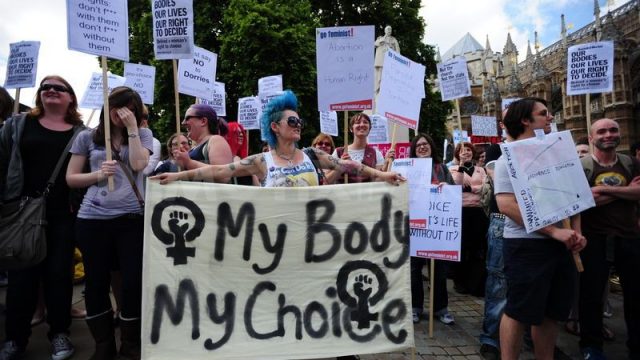"So what if abortion ends life?"

Yesterday, in writing about the 40-year anniversary of the Roe vs. Wade Supreme Court decision I wondered if debating the cost to society of unwanted pregnancies and children wasn’t a slippery slope toward devaluing human life. After all, if a mere calculation of cost to society is all that’s needed to justify a death sentence, then why aren’t we executing homeless people?
As evidence that concern over this slippery slope is justified, I wanted to point out this article published today at Salon by staff writer Mary Elizabeth Williams asking “So what if abortion ends life?”
Of all the diabolically clever moves the anti-choice lobby has ever pulled, surely one of the greatest has been its consistent co-opting of the word “life.” Life! Who wants to argue with that? Who wants be on the side of … not-life? That’s why the language of those who support abortion has for so long been carefully couched in other terms. While opponents of abortion eagerly describe themselves as “pro-life,” the rest of have had to scramble around with not nearly as big-ticket words like “choice” and “reproductive freedom.” The “life” conversation is often too a thorny one to even broach. Yet I know that throughout my own pregnancies, I never wavered for a moment in the belief that I was carrying a human life inside of me. I believe that’s what a fetus is: a human life. And that doesn’t make me one iota less solidly pro-choice. …
Here’s the complicated reality in which we live: All life is not equal. That’s a difficult thing for liberals like me to talk about, lest we wind up looking like death-panel-loving, kill-your-grandma-and-your-precious-baby storm troopers. Yet a fetus can be a human life without having the same rights as the woman in whose body it resides. She’s the boss. Her life and what is right for her circumstances and her health should automatically trump the rights of the non-autonomous entity inside of her. Always.
What Williams is arguing is that the value of life is not inherent, but rather relative to other things. Such as the opinion of the mother in the instance of pregnancy. That there is no small amount of evil that can justified with such thinking apparently escapes Williams.
Nazis felt it was moral to execute Jews because a Jewish life wasn’t equal to a non-Jewish life.
Southern plantation owners felt slavery was moral because a black’s life wasn’t equal to a white’s life.
If life begins on conception, which Williams says she believes it does (and which, besides, is incontrovertible scientific fact) then why should that life be valued less simply because the mother doesn’t want the child? Or because the child is in the womb?
Here’s a hypothetical: What if we one day produce the technology and knowledge necessary to take a child out of the womb immediately after conception and allow it to gestate entirely outside of the mother’s body? Will we still allow that child to be terminated because the mother doesn’t want to raise it? Or because the child might, in the estimation of some, be a burden to society? Or will that child’s life suddenly be worth more because, thanks to technology, it can survive outside the womb?
I don’t think these are questions our friends in the pro-abortion movement have good answers for.







